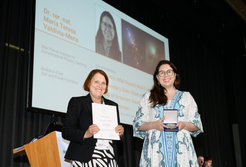Honoured twice
Teresa Valdivia-Mena receives both Otto Hahn Medal and Otto Hahn Award from the Max Planck Society
Teresa Valdivia-Mena, former PhD-Student in the CAS-group, was recently honored with both the Otto Hahn Medal and the Otto Hahn Award from the Max Planck Society for her doctoral research on streamers in protoplanetary disks. The awards were presented during the Max Planck Society’s annual meeting in Magdeburg last week. In this interview, she reflects on her dissertation, the award ceremony, and the direction of her ongoing research.

Teresa, for your outstanding dissertation, you received both the prestigious Otto Hahn Medal and the Otto Hahn Award from the Max Planck Society. What did you work on during your dissertation?
In my dissertation, I worked on streamers, which are long and thin channels that transport material to protoplanetary disks surrounding protostars. Sometimes, these streamers are so long (several thousands of astronomical units) that they connect the disk with the environment beyond their original core from which they were born. I used radio interferometers, which are arrays of telescopes that allow us to observe the coldest gas and dust in our Galaxy, to trace the molecular content of streamers. During my time at MPE, we proved that streamers are not isolated phenomena but can actually be found toward 40 - 60% of protostars, at least in nearby star-forming regions. We were the first team to give such a statistic.
What excites you most about your research?
What excites me the most is the possibility to revolutionize our comprehension of how both stars and planets form. Our research on streamers proved that it’s a common phenomenon, but now we need to determine what changes are driven by them within protostellar systems. Do they aid the formation of planets? Can they explain the different properties of protoplanetary disks? What about the different chemical elements they bring to the disk? Simulations from our collaborators around the world already suggest these channels of accretion can modify the structure of disks and trigger instabilities that can jumpstart planet formation. Our research has opened the door to completely change the way we think our planet and our Sun were born.
What does receiving the Otto Hahn Medal and the Otto Hahn Award mean to you?
This award tells me that my work has an impact on the future of our research area. It is a recognition to all the hours of hard work; the long observing runs at the telescope and afterwards on data processing. Sometimes in that time you wonder if your work can actually change or advance your field. With this award, I can be reassured that I’m on the right path, that my research matters. I am inmensely honored to receive both the Otro Hahn Medal and the Award. I am grateful for the support and encouragement from my supervisor, Dr. Paola Caselli, my direct mentors, Dr. Jaime Pineda and Dr. Dominique Segura-Cox, and all my colleagues from the Center for Astrochemical Studies at MPE.
Can you give us a little insight into the award ceremony during the annual Meeting of the Max Planck Society?
It was so inspiring to see all the research done at other institutes. I was amazed at the diversity of topics presented in the ceremony, from protein folding to Linux development and Artificial Intelligence. It was also touching to see that many of us awardees came with our families and how they could also enjoy the whole experience. There was even a tiny baby accompanying their dad!
You left MPE last year and went to ESO. How is it going there? Are you still following the same research interests?
Working at ESO has been a wonderful experience so far. I have been able to connect with people working very close to the telescopes (both which I use and which I might want to use in the future) and learn a lot about their intricacies. At the same time, I have the freedom to work on my original research ideas, thanks to my Fellow status. There is a strong Star and Planet formation group at ESO, which I am getting to know and are developing exciting new projects together. As I am still on the Garching campus, I can visit MPE and stay connected with my colleagues. We still work and brainstorm new ideas together.












